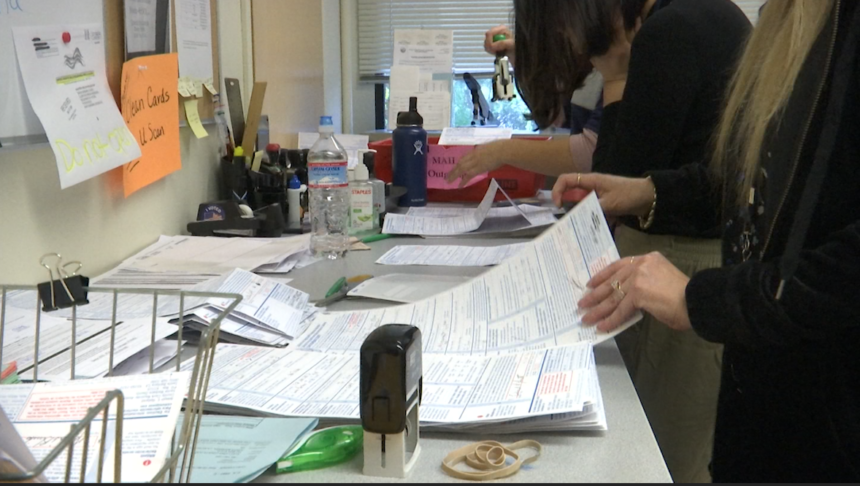After Iowa Caucus chaos, local election officials discuss safety protocols for March primary

SANTA BARBARA, Calif. - The primary election is less than a month away and after a chaotic process with the Iowa caucuses, Central Coast experts and election officials are giving an insight about how they work to ensure the process is safe and secure.
At the Santa Barbara County Clerk-Recorder office, voting machines are being tested as other preparations are underway.
Clerk-recorder Joe Holland shows us a room with computers, only accessible by employees with a badge. “This is where we count the ballots, this is where we actually tabulate," Holland says.
In Iowa, results of this week's caucuses are still incomplete. A new app meant to streamline the process crashed, delaying the results and calling for recounts.
In Santa Barbara County, “we take election security and voter fraud very very seriously," said Holland.
Fraud has not been linked to the chaos in Iowa, but experts say it is a common concern come election time.
“The one that many folks are concerned about, and that seems to get the most attention, is actually the least frequent type and that's voter impersonation fraud," said Michael Latner, political science professor at Cal Poly. “So if someone votes in two states, or someone who is ineligible like an ex-felon votes and they're not supposed to, we typically catch people and they get prosecuted.”
“We really don't get any non-citizens registering," said Holland.
When the DMV launched its automatic voter system, some worried about non-citizens trying to sign up. In California, undocumented drivers can apply for a license, but not voter registration.
“There are two separate types of driver's license that are provided by the DMV – one for citizens, one for non-citizens, and non-citizens don't get on the voter registration list," said Latner.
However, Holland said if a non-citizen somehow registered, his office wouldn't have a way of checking.
“But, again, if you're not a citizen, and you vote, and you ever wanted to become a citizen, then you wouldn't be able to become a citizen. And that's a pretty big deterrent for people," the clerk-recorder said.
"[Voter fraud] is perpetuated by a very small number of people who argue that there is a widespread voter fraud, like the president, and it is simply not true," said Latner.
According to the Transactional Records Access Clearinghouse (TRAC), a data research organization at Syracuse University, "out of 13 comprehensive data profiles of ICE detainees, which includes over 500,000 detention records, only two detainees (0.004%) had an election-related conviction."
Latner says there are more common ways to disrupt an election.
“If you wanna rig an election, you actually exclude people, so you take people off the voter rolls, you purge voter lists," he said.
The Cal Poly professor explains in California, unlike other states, the county clerk-recorder office is nonpartisan, which is meant to protect the electoral process.
“The types of election fraud that are actually much more frequent are the kinds of fraud that are committed by those that are administering the elections."
Latner adds that the state recently passed a number of laws to increase the security of the voting system, like the statewide voter registration list.
"It is centralized in Sacramento, so when someone changes residency or someone dies, there's a death certificate. That information automatically gets synced up with the voter registration system.”
When it comes to voting by mail, election officials are double checking signatures to confirm the vote.
“If it doesn't match, we're not gonna count that ballot and we outreach the voter so that they can come in and correct their signature," said Holland. "We've never had the case where they come out and say 'Oh we didn't vote that ballot'.”
There are other threats to the process, though.
“The Russians, and North Korea and even China, those are concerns that they could hack into our system," said Holland. “We work with our IT department and we meet regularly with the Department of Homeland Security and the FBI. We actually have the Grand Jury come in once a year and come observe the elections.”
The elections office is also fully alarmed, and it is under constant video surveillance.
“Our vote tabulation system is actually not even hooked up to the internet, so there's no way they can hack into that," said Holland.
Latner say if there are errors, “most of them are human errors.”
The California primary election is March 3.
